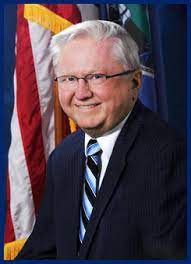When lawmakers return to the Capitol next week, one of the looming issues will be the fate of the budget for the state banking commissioner.
Before recessing for its annual break, the Legislature passed a spending plan that zeroed out the $13 million budget for the Office of the State Banking Commissioner, which regulates state-chartered banks and trust companies in Kansas.
The money for the bank commissioner’s office was deleted as the bank commissioner was engaged in a fight with Beneficient Fiduciary Financial LLC, a new type of financial institution created by the Legislature two years ago.
The institution is known in financial parlance as a Technology-Enabled Fiduciary Financial Institution, which is referred to in shorthand as a TEFFI. It allows affluent investors to borrow against alternative assets that can be hard to turn into cash.
Lawmakers are expected to take up the banking commissioner’s budget next week when they return to the Capitol.
The matter could potentially be resolved by an agreement already reached between the state banking commissioner and Beneficient.
A year ago, the banking commissioner sounded alarms about Beneficient, including his inability at the time to get audited financial statements.
The company also has drawn criticism from a Democratic state senator who suggests the company shouldn’t be trusted to do business in Kansas.
The amendment deleting the funding was offered by Republican state Sen. J.R. Claeys of Salina, who suggested in general terms that the amendment was intended to send a message to the bank commissioner.
“We are looking for the state banking commissioner to be responsive to some items, and the power of the purse is the way we accomplish that,” Claeys said when the amendment was offered in the afternoon of April 4.
“I would expect he will be very responsive after we have zeroed out his budget for ’24 and ’25,” Claeys said.
Claeys declined comment to be more specific.
A spokesperson for Senate President Ty Masterson emphasized that the budget process is not over.
And the governor’s office believes the bank commissioner’s budget will be addressed next week along with other items that are being held until then.

“The budget process is not complete and the bank commissioner’s budget will be reviewed at omnibus along with the rest of the items still unresolved,” said Mike Pirner, spokesperson for the Senate president.
David Herndon, the state bank commissioner, declined to speculate about why the money was deleted from his agency’s budget.
“I can’t speak to what was on the legislator’s mind that took that action,” he said. “I just have to tell you to get that information from them.”
Beneficient couldn’t be reached for comment.
The amendment deleting the agency’s budget was introduced on the same day that a Beneficient executive testified that the company was at odds with the Office of the State Banking Commissioner over whether the company could be considered a trust.
Beneficient told lawmakers that its plans to go public were being hindered over whether it could be defined as a trust, something that would have been cleared up by new legislation pending before a Senate committee.
In its registration statement with the Securities and Exchange Commission, Beneficient indicated it was a trust, a classification questioned by federal regulators because of issues with the bank commissioner, according to the testimony.

Derek Fletcher, Beneficient’s president and chief fiduciary officer, told lawmakers in written testimony on April 4 that the company is a trust under the state law that created this type of financial institution.
“Despite the clear and unambiguous language of the statute, the commissioner has been unwilling to acknowledge BFF’s status as a trust company,” he said.
“This is, of course, disappointing – particularly since there is no statutory support for his position,” he said.
“That law is abundantly clear – yet the regulatory body charged with overseeing that law has chosen to ignore the express language of the statute,” Fletcher said.
“This unsupportable position jeopardizes BFF’s business, Ben’s public listing and the long-term success of the TEFFI industry,” he said.
Fletcher told lawmakers that the matter was “urgent” and quick resolution was “critical.”
The company, he said, has a “legal obligation to make full and adequate disclosures to the judiciary and to state and federal regulators.
“The OSBC’s unsupportable position demands that (the company) make inaccurate and deficient disclosures,” he said.
Republican state Sen. Jeff Longbine, chair of the Senate financial institutions committee, said the bill ultimately wasn’t needed after Beneficient and the banking commissioner came to an agreement resolving their differences.
Herndon said Monday his agency and Beneficient signed a memorandum of understanding that said the company has trust powers as defined by the law that created the institution.
“The whole question was whether they were a trust company or not,” Longbine said.
“The bank commissioner was valid in their concerns because a TEFFI trust company is different than a regular trust company in what powers they have,” he said.
“Basically what we came down to is a TEFFI is a trust company as defined by the TEFFI act,” he said,
The Kansas Legislature created the so-called TEFFI in 2021, with the goal of giving sophisticated investors the ability to liquidate alternative assets such as venture capital and private equity that aren’t easily converted to cash.
In reporting Beneficient’s formation in 2018, the Dallas Morning News reported that the company was homing in on 1.3 million “ultra-high-net-worth households,” or people with assets between $5 million and $25 million, because they already held alternative investments.
The company also planned to pursue institutions with less than $1 billion in assets, as well as private equity funds, the newspaper reported.
Brad Heppner, who founded Beneficient, told the Morning News that he had $2 billion to lend to customers, including 40% of his money, 10% from other investors and board members, and half from GWG Holdings, now the focus of a federal securities investigation.
Supporters of the Kansas effort say it has no fallout for Kansas taxpayers and is not comparable to providing any kind of tax incentive.
Democratic state Sen. Tom Holland of Baldwin City has been one of the leading skeptics of Beneficient, comparing it to disgraced energy company Enron and calling for a repeal of the law that created this type of financial institution.













